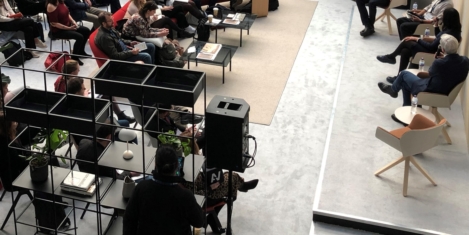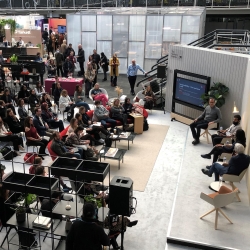To provide the best experiences, we use technologies like cookies to store and/or access device information. Consenting to these technologies will allow us to process data such as browsing behaviour or unique IDs on this site. Not consenting or withdrawing consent, may adversely affect certain features and functions.
The technical storage or access is strictly necessary for the legitimate purpose of enabling the use of a specific service explicitly requested by the subscriber or user, or for the sole purpose of carrying out the transmission of a communication over an electronic communications network.
The technical storage or access is necessary for the legitimate purpose of storing preferences that are not requested by the subscriber or user.
The technical storage or access that is used exclusively for statistical purposes.
The technical storage or access that is used exclusively for anonymous statistical purposes. Without a subpoena, voluntary compliance on the part of your Internet Service Provider, or additional records from a third party, information stored or retrieved for this purpose alone cannot usually be used to identify you.
The technical storage or access is required to create user profiles to send advertising, or to track the user on a website or across several websites for similar marketing purposes.
 A new report based on a survey of 2,000 hybrid and remote employees claims that 8 in 10 people often feel anxious or worried about attending day-to-day work meetings. The white paper titled ‘Zoomed In, Zoned Out’ has been released by Craft Docs [registration], and reports on hybrid and remote workers’ attitudes towards business meetings and other daily workplace processes in 2023. (more…)
A new report based on a survey of 2,000 hybrid and remote employees claims that 8 in 10 people often feel anxious or worried about attending day-to-day work meetings. The white paper titled ‘Zoomed In, Zoned Out’ has been released by Craft Docs [registration], and reports on hybrid and remote workers’ attitudes towards business meetings and other daily workplace processes in 2023. (more…)













 Workspace Design Show, the leading trade show bringing together the UK workplace design community, returns to London’s Business Design Centre for its eagerly awaited third UK edition from 27-28 February 2024. At the 2023 event, visitor number increased by an impressive 75 percent year on year with exhibitors from over 20 countries showcasing innovative and transformational workplace interiors products over the two days. Building on this success, over three quarters of stand space is already booked for 2024.
Workspace Design Show, the leading trade show bringing together the UK workplace design community, returns to London’s Business Design Centre for its eagerly awaited third UK edition from 27-28 February 2024. At the 2023 event, visitor number increased by an impressive 75 percent year on year with exhibitors from over 20 countries showcasing innovative and transformational workplace interiors products over the two days. Building on this success, over three quarters of stand space is already booked for 2024. 




















September 14, 2023
Is the Flexible Working Bill a game changer or paper tiger?
by Sam Ross • Comment, Flexible working